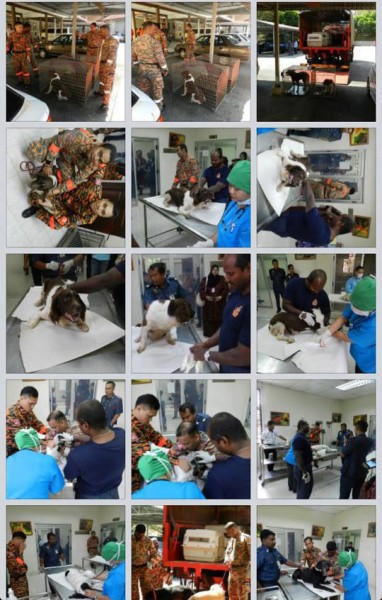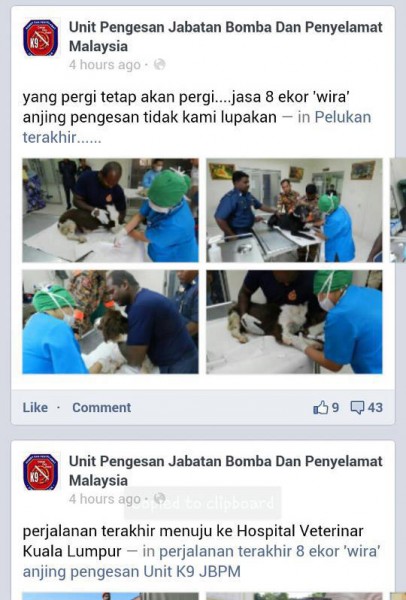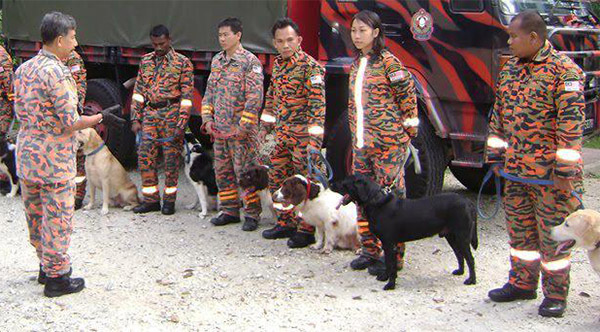Find Alternative Solutions to Euthanasia of Service Dogs
| Tweet |
The Fire and Rescue Services Department’s Sniffer and Detection Dogs Unit inadvertently created an uproar among Netizens when they published photographs of their retired service dogs being euthanised due to old age and illness. Overwhelmed by the number of irate emails and comments on their Facebook page, the Unit then removed the photographs and published a disclaimer to explain that the dogs were euthanised due to chronic illnesses — a weak defence indeed against the swelling group of angry and incredulous animal advocates.
It is acknowledged that the service dog handlers and Fire and Rescue Services Department may have just been following instructions and may not be the ones making the decision to euthanise the dogs. It is further acknowledged that many government departments all over the world consider it necessary to euthanise retired service dogs due to financial constraints and because the nature of the work the dogs have been subjected to may make them unsuitable for rehoming, as they may not adapt to living in small spaces with children and other animals. However, it is seen that most governments and societies around the world are in favour of rewarding the invaluable service provided by these brave and loyal dogs. Many countries now have programmes to either rehome the dogs with former servicemen or civilians, or in special sanctuaries and shelters for service dogs.
As the Fire and Rescue Services Department falls under the jurisdiction of the Ministry of Housing and Local Government, on behalf of concerned citizens, I urge the Ministry to consider and immediately implement alternatives to euthanising ill and retired service dogs. It is an affront to the values the Ministry claims to espouse — namely, peace, sustainability, safety and a high quality of life — to so callously terminate the lives of dogs who have so gallantly put their lives on the line to serve humans.

Service dogs, including those who have terminal illness, can still be put up for adoption. The relevant departments have a moral obligation to seek medical care for ill and injured service dogs before making the decision to either put the dogs up for adoption or sending them to a shelter or sanctuary. This is where the relevant departments will need to work together with the Department of Veterinary Services for the latter’s assistance. The Sniffer and Detection Dogs Unit only has to make a disclosure as to the dogs’ personalities and medical history in order that potential adopters understand what to expect and whether they are able to provide for a particular dog’s needs. There are many animal-lovers who are willing to provide retired service dogs with a comfortable and loving final home despite knowing of their illnesses. Individuals with large fenced premises who have experience with large-breed working dogs are also able to adopt former service dogs who have high energy levels and strong hunting and seeking instincts. It is incumbent that the Ministry looks into these options before ordering all the Fire and Rescue Services dogs to be put down on the assumption that they cannot be rehomed.
A representative of the Royal Malaysian Police force has mentioned that retired police service dogs are not euthanised. Perhaps the Fire and Rescue Services Department could learn about alternatives to euthanasia of former service dogs from the police force. Some dogs may be adopted by their handlers due to the strong bond between the two, while others may be put up for adoption to suitable homes. The government should reduce the bureaucratic red tape surrounding the adoption of former service dogs and simplify the paperwork in order to make the rehoming process easier and faster for big-hearted civilians. The SPCA can assist and advise the government in vetting adoption applications, interviewing and evaluating potential adopters and inspecting homes and properties.
The government should also take steps to establish a sanctuary or shelter for retired Fire and Rescue Services, police and military service dogs until they could be rehomed or until they live out the rest of their lives. This is the very least the government could do to ensure that service dogs receive the care, comfort and dignity that they have earned through their hard work and selfless service to society.
These dogs have served the nation valiantly and with obvious passion for their work. They have put their lives in danger to spare their human handlers the same danger. Their needs are simple and they expect no extravagant pension or benefits. Many do not even live for many years to enjoy much comfort or care following their retirement from active service. They deserve every chance possible to live out their golden years in peace and reasonable comfort. We owe it to these brave dogs to create these chances for them. And we owe it to ourselves and our society to practice the values of compassion, gratitude, accountability and loyalty that we claim to uphold.

| Tweet |


Facebook Comments